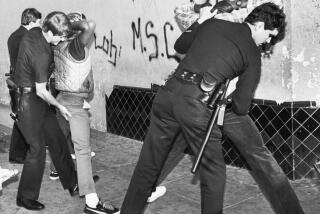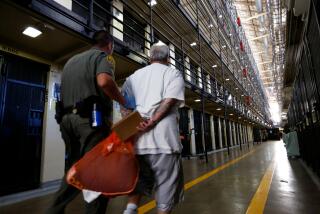Why efforts to scale back California’s ‘three strikes’ law for juveniles are failing

Marco Flores was just 16 in 2007 when he and a group of friends attended a party in Pacoima, where an argument broke out and one of his friends shot and killed a man who was patting down guests for weapons.
Flores, who said he wasn’t involved in the killing but fled the scene, was arrested with two co-defendants and charged with crimes including murder. He agreed to a plea deal with the Los Angeles County district attorney’s office to avoid the harshest possible sentence and to avoid going to trial in adult court. But prosecutors can use sentence enhancements to add time, including those allowed under California’s “three strikes” law, which was approved by voters in a 1994 ballot measure.
Flores received 11 years for voluntary manslaughter, which was counted as a strike. His deal required him to admit to a separate crime — a robbery in which he was a suspect — that added a second, juvenile strike and doubled his sentence to 22 years. A gun enhancement added another decade. Another serious or violent felony could land Flores, now 30, in prison for the rest of his life.
“I carry that I have two strikes with me,” Flores said. “I was just a kid. I wasn’t thinking right. I take full responsibility for my choices. But I feel like I still carry that with me.”
Sentences like Flores’ are why criminal justice activists are lobbying the California Legislature to eliminate juvenile adjudications — similar to an adult conviction for a crime — from the three-strikes law. They argue that the policy disproportionately affects youth offenders of color and fails to consider their brain maturity. Advocates also say that because juvenile adjudications aren’t handled in criminal court with the opportunity for a jury trial, they shouldn’t be used as sentence enhancements for adult felonies.
Strikes are given for serious or violent felonies such as rape, murder, robbery and assault with a firearm. A prior strike can double the sentence of a second felony, even if it is not violent or serious, and a third strike could mean 25 years to life in prison. If a defendant who is at least 16 years old previously received an adjudication as a juvenile, that can also be considered a strike.
Advocates saw their best hope to change California’s three-strikes law fizzle last month in the state Capitol, a result of opposition from moderate Democrats and a number of legislative vacancies that left supporters short on the votes needed for passage.
Assembly Bill 1127 by Assemblymember Miguel Santiago (D-Los Angeles) would have prohibited juvenile adjudications from being considered a strike. It would have also applied retroactively, giving those serving a three-strike sentence with a juvenile adjudication a shot at resentencing.
The bill’s demise offers a snapshot of the deep division among Democrats in Sacramento when it comes to proposals that would scale back California’s tough criminal justice laws, particularly in an election year when crime will be a top issue.
Its failure also challenges the ambitious agenda of the Committee on Revision of the Penal Code, an independent seven-person commission that recommended a total repeal of the three-strikes law in a December report.
A California committee is recommending an end to the state’s controversial ‘three strikes’ law and changes to lifetime prison sentences without the possibility of parole.
The panel argued that California’s application of the law has deepened racial inequities without enhancing public safety. According to the report, more than 33,000 people in California’s prisons are serving three-strikes sentences, a third of the total population. Eighty percent of those sentenced under three strikes are people of color.
The committee recommended eliminating juvenile adjudications from three strikes as an alternative to total repeal of the law, acknowledging that it was a “difficult goal.” In 2009, the California Supreme Court ruled that juvenile adjudications can be used to enhance an adult criminal sentence. Another effort to change the law could require another ballot measure, similar to when voters in 2012 passed an initiative to limit the imposition of a third strike to a conviction for a violent or serious crime, or a two-thirds majority vote in both houses of the Legislature.
Michael Romano, chairman of the committee and a Stanford Law School lecturer, said California should focus on rehabilitating youths rather than issuing strikes that “can come back and really have a significant impact on a future sentence.”
Miguel Garcia, 28, has earned three associate degrees, a bachelor’s degree in political science from UC Riverside, graduated without debt, serves on several juvenile justice committees in the state, owns a home in Fresno and is a father to two daughters. But he still can’t shake a 2010 juvenile strike for attempted murder, despite his “extraordinary level of rehabilitation,” according to a Board of Juvenile Hearings honorable discharge order.
Garcia was 16 when he committed the crime and served three years before he was granted a discharge from a juvenile parole board. He now works as a state youth justice specialist for the Anti-Recidivism Coalition, a Los Angeles nonprofit that supports formerly incarcerated people and supported AB 1127.
“The juvenile justice system was not meant to leave the young person worse than when they arrived, but better in hopes that they thrive in the community that they returned to,” he said. “The juvenile strike does not leave me better off.”
Supporters of AB 1127, including the L.A. County district attorney’s office, aren’t giving up on hopes to change the law this year. Santiago said he will introduce another bill before a mid-February deadline, though it’s unlikely to be as sweeping.
“Justice work is hard work, and it takes time,” Santiago said. “Rolling back some of the heavy, hard-on-crime, lock-them-up, throw-away-the-keys [law] has taken us decades to turn around. This is part of the process. We have to change hearts, minds and souls.”
Among the minds Santiago has to change is that of his colleague, Assemblymember Jim Cooper (D-Elk Grove).
The former captain in the Sacramento County Sheriff’s Department said there is little appetite in the Legislature this year for bills like AB 1127, which he said fails to consider victims. Cooper is now running for sheriff, and told the Sacramento Bee that he will make youth outreach a top priority on the job.
Cooper instead favors bolstering rehabilitation programs and searching for other ways to reduce recidivism. He said Santiago’s new proposal shouldn’t include eliminating a juvenile strike for crimes such as rape and murder.
“Some things are so reprehensible that you don’t get a second chance,” he said. “If they want to help the most people, leave the sex stuff out, the violent stuff out. They want to have a blanket exemption for everybody. And to be honest, that’s what’s hurting them on these bills.”
The California District Attorneys Assn. shares some of the same worries.
Greg Totten, the association’s chief executive, raised concerns with the bill’s retroactivity, and said it would strip from judges and prosecutors the flexibility to apply or remove a strike.
“If we can take a young person that is engaged in criminal misconduct in the juvenile court system, and direct them in a positive, more productive pathway, we’re going to do that,” Totten said. “But there’s a balance to the scales of justice. …The scale has to be balanced to reflect what happened to the victims.”
Flores hopes that legislation like AB 1127 will help him start anew.
He would still be incarcerated if he hadn’t written to then-Gov. Jerry Brown in 2018, asking for the chance to present his case to a parole board, he said. By then, he had served a little more than a third of his sentence and had participated in a number of rehabilitative programs such as Alcoholics and Narcotics Anonymous, a self-help course on childhood trauma and another on criminal and gang mentality.
In September 2019, Flores was released from Ironwood State Prison in Riverside County and entered a six-month transitional housing program before returning to his native San Fernando Valley.
He enrolled in West Los Angeles College to study film, with plans to graduate this year. He’s a member of the Anti-Recidivism Coalition and found an internship as a grip in a production crew, which he plans to join full time once he’s in a union.
“I love where I’m at today,” he said.
More to Read
Start your day right
Sign up for Essential California for news, features and recommendations from the L.A. Times and beyond in your inbox six days a week.
You may occasionally receive promotional content from the Los Angeles Times.








